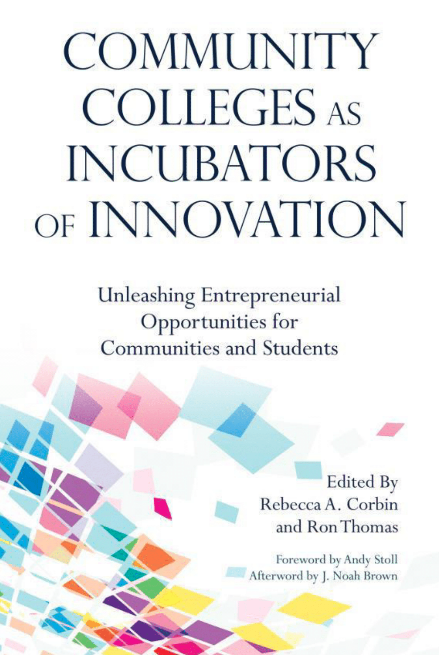Leading with an Entrepreneurial Mindset
By Bree Langemo J.D. (excerpted from NACCE’s new book, Community Colleges as Incubators of Innovation: Unleashing Entrepreneurial Opportunities for Community and Students, 2019, Stylus LLC.)
The world is changing in ways we could have never anticipated. Unlike the industrial revolutions of the past, the Fourth Industrial Revolution is advancing at a far greater pace than humankind has ever experienced. Given the advancement of technology, the new world of work, and changing job types that will require new skill sets, the need for all levels of society to be entrepreneurial has never been greater. Yet, our current educational models have not kept pace, with many schools keeping entrepreneurship at the perimeter of their curriculum and organizational strategy. It will require significant entrepreneurial leadership to reinvent the current educational model and create the entrepreneurial learning environments needed to cultivate an entrepreneurial mindset in academic leaders, faculty, and students in classrooms and across campuses.
In the World Economic Forum’s Educating the Next Wave of Entrepreneurs 2009 report, the Global Education Initiative Committee comments, “We believe entrepreneurial skills, attitudes, and behaviors can be learned, and that exposure to entrepreneurship education throughout an individual’s lifelong learning path... is imperative.” The report addresses entrepreneurship education in the broadest and most comprehensive manner at that time. The report goes on to state, “Not everyone needs to become an entrepreneur to benefit from entrepreneurship education, but all members of society need to be more entrepreneurial... We need to create the types of environments that are conducive to encouraging entrepreneurial ways of thinking and behaving.”
The report strongly emphasizes the need for entrepreneurship to be deeply embedded across college campuses and disciplines in order for all students and faculty to be exposed to entrepreneurship education, no matter their chosen path. To do so, the entrepreneurial mindset must be cultivated at the individual level focusing on the development of entrepreneurial attitudes, behaviors, and skills. This cultivation requires experiential learning and real engagement in the entrepreneurial process. It requires interaction with real world entrepreneurs, preferably local, to serve as socially relatable role models, a component of self-efficacy. And, it requires an entrepreneurial educator who acts as a facilitator guiding the entrepreneurial learning process so that the students take ownership of their learning.
Shifting Mindsets
The World Economic Forum details effective aspects of an entrepreneurship program, which should “focus on building self-confidence and self-efficacy as well as developing the practical skills necessary for students to initiate and pursue ideas, and provide them with experience in building the necessary teams around them to implement projects. Entrepreneurship education should not be limited to a focus on startups... but should be focused on shifting mindsets and developing skills which can be applied in many forms and entrepreneurial settings.”
The World Economic Forum offers several ways for institutions to inspire and strengthen entrepreneurial learning environments, including:
- Encourage all faculty of all disciplines to expose students to entrepreneurship at every level in a cross-disciplinary environment;
- Implement entrepreneurship education with an experiential learning model that also incorporates video case studies of real-world entrepreneurs as well as local entrepreneurs; and
- Build a pipeline of entrepreneurial educators through entrepreneurial training and education.
It is critical and ever-pressing that education heeds the call to move entrepreneurship from the perimeter to the core of the way it operates in order to remain relevant, as well as produce the entrepreneurial graduates needed for the future of society. To become an entrepreneurial institution, entrepreneurship must be a part of the organizational DNA, embedded in the institution’s vision, mission, and value system. Leadership must commit to leading with an entrepreneurial mindset and embracing entrepreneurship from the highest level in order to achieve success.
To learn more, read NACCE’s new book, Community Colleges as Incubators of Innovation.
To order, click here.

Bree Langemo is an Innovative Collaborator on Impactful Work and is the founding member and board chair of uCodeGirl, a nonprofit group focused on developing computing and entrepreneurial skills in young girls. As the former president of the Entrepreneurial Learning Initiative (ELI), she led the development of the ELI’s Ice House Student Success Program.

